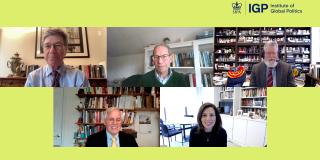Perspectives on What’s Next in the War in Ukraine

After two years of war with Russia, the path to peace in Ukraine remains unclear.
That was the upshot when SIPA’s Institute of Global Politics convened four scholars of international politics to share their perspectives on the conflict and discuss what might be next for the eastern European country.
The lively one-hour dialogue, held via Zoom on January 29, was the first of several events this year that will be devoted to Ukraine and its future. Participants included Michael C. Desch of Notre Dame, where he is the Packey J. Dee Professor of International Relations; Charles Kupchan, a professor of international affairs at Georgetown; and Jeffrey Sachs, a University Professor at Columbia who directs the Center for Sustainable Development. Adjunct Professor Peter Clement, who is also a senior research scholar at the Saltzman Institute of War and Peace Studies, served as moderator.
“We need to understand that Russia has already been dealt a strategic defeat. Putin wanted to take over Ukraine and he was rebuffed,” said Kupchan. “As a consequence, I would focus on ensuring that the Ukraine that exists today is able to defend itself for the long haul and rebuild itself economically and politically.”
“I don't think continuing the level of aid to Ukraine that we've had up until a few months ago is any longer in the cards politically,”
- Michael C. Desch
While Kupchan said the war in Ukraine is headed towards a stalemate, Sachs disagreed, arguing that the potential for ceasefire and further negotiations are far on the horizon.
“Russia is bloodying Ukraine all along the entire contact line right now. They've got a lot more reserves, a lot more weapons, a lot more artillery, a lot more missiles than Ukraine,” said Sachs. “I do not think it’s right to declare this as a stalemate. I think it could be an absolutely ungodly mess that we have pushed Ukraine into.”
Despite their disagreement about what’s likely in the near term, the scholars agreed broadly that NATO’s steady expansion into eastern Europe played a factor in Putin’s decision to go to war.
“I think part of Putin's grievance was NATO enlargement,” Kupchan said. “But I would point out that the offer that Putin put on the table in 2020 was not just about neutrality for Ukraine, it was about rolling back to the post-Cold War order, pulling out NATO materiel from the eastern flank.”
The discussion came at a time where the world faces a significant election cycle comprising many of the world’s most populous democracies — including India, the United States, and Indonesia. It is quite possible that new leaders will play an outsized role in determining Ukraine’s future.
Considering one possible outcome of the 2024 US presidential election, Kupchan said a Trump victory might lead to the revival of peace talks between Ukraine and Russia but would also result in collateral damage to the United States’ reputation.
“If Trump were elected, maybe he would cut a deal with the Russians; maybe he would be able to negotiate a ceasefire,” Kupchan said. “But I also think that the message sent globally [would be] that the United States doesn't know its own mind — that it is an unreliable partner — and [Trump’s] mere election, regardless of what he does in foreign policy, would do a lot of damage to America's relationships around the world.”
Clement asked what advice the scholars would give President Biden to help achieve a ceasefire if not a negotiated settlement.
“I would just simply say that public opinion has soured on Ukraine,” Desch said. “While People still, in general, wish them well, the idea of continuing to dump large amounts of money to no seeming end, I think… is not a winning strategy.”
Desch added that the administration may have to choose among competing priorities that include support for Israel and spending on the United States’ southern border in addition to aid for Ukraine.
“As a practical matter, you've got to decide what's most important to the country and what can you do, and I don't think continuing the level of aid to Ukraine that we've had up until a few months ago is any longer in the cards politically,” he said.
Assessing Putin’s agenda, Kupchan called the Russian leader “a troublemaker” and said the United States and its allies need to return to a policy of containment. “As long as Putin is in power, the Russian foreign policy will be more of same,” he said.
Desch did not concur, suggesting that Putin’s objectives may in fact be limited and his desire for Ukraine to remain neutral is not a radical stance. “It is the ideologicalization of Putin that has put us in a position where we see the worst in him and we see no basis for accommodation,” he said.
Sachs, for his part, called the United States to adopt a different approach to foreign engagement entirely.
“I think if we had a more mature foreign policy that was more respectful of truth, honesty, and, and making peace and not pushing limits, we would find the same on the other side,” he said. “We're in a very confused state. We need to calm down and stop the provocations that have led us to all of these conflicts.”
IGP will host a multi-part event devoted to “The Future of Ukraine” on February 7, welcoming scholars and other experts to discuss the ongoing battle around NATO assistance to the country, the role of the West in supporting a rebuilding effort after the war, and what’s needed to ensure long-term peace, stability, and economic recovery for the Ukrainian people. Highlights include an IGP Spotlight Interview featuring Ambassador Oksana Markarova, Ukraine’s envoy to the United States, in conversation with Secretary Hillary Rodham Clinton.
Watch the full event below: